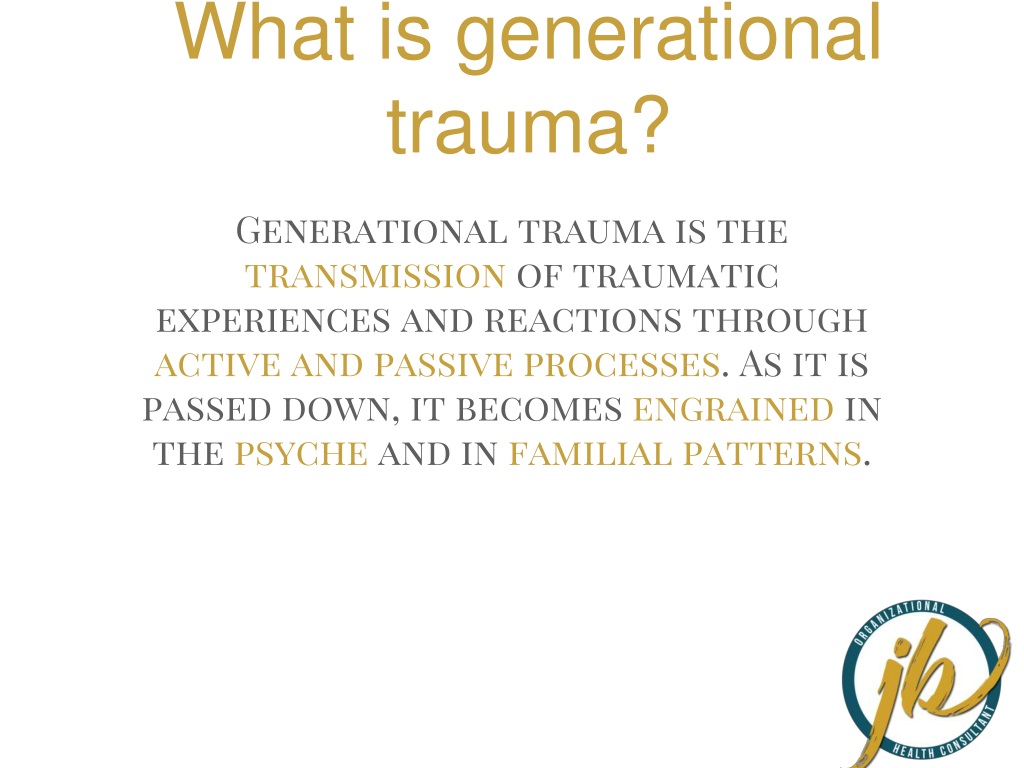
Urban Society for Aboriginal Youth, YMCA Calgary, & University of Calgary.American Psychological Association Monitor on Psychology. Bombay, A., Matheson, K., & Anisman, H.We can’t effectively address injustice in the present without understanding the intergenerational effects of collective trauma.Īre you familiar with intergenerational trauma? If so, in what context? References For groups that have been oppressed and traumatized through generations, the conversation needs to be much broader than simply what’s happening now. This concept is quite relevant to some of the conversations that are happening now. Recent research suggests that epigenetic changes are actually transmissible from one generation to the next. Circumstances don’t change the genes themselves, but they can produce epigenetic changes, which alter the production of proteins based on these codes.
#INTERGENERATIONAL TRAUMA SERIES#
Our genes consist of a series of codes for making proteins. When traumatic events occur while a woman is pregnant, her stress hormones can influence the fetus. We’re all influenced in utero by what’s going on for our mother while she’s pregnant. Colonialization can produce a strong sense of powerlessness, which can be transmitted through families. Residential schools had a very direct impact on parenting survivors who were taken away from their parents as children had no modelling of what parenting should look like. The effects of trauma may compromise parenting abilities. Survivors may face poverty as a result of the traumatic events, which has an impact on their children. Parents may also pass on problematic coping strategies to their children. Children may learn to make negative appraisals of themselves and the world, leading to expectations that future threats are more likely and unpredictable.

These messages may have been important for survival while the trauma was occurring, but once the events have passed, it can make people reluctant to self-disclose and to seek help. Parents may transmit fear-based survival messages to their children. The transmission of trauma from one generation to another appears to occur through a combination of different mechanisms, involving both nature and nature. I didn’t come across anything about intergenerational transmission of trauma as a result of traumatic events occurring at an individual level, but that doesn’t mean it doesn’t happen. The research on intergenerational trauma seems to focus on collective traumatic events.

Interventions to address intergenerational trauma in this population tend to focus on reconnection with culture and cultural identity. This has produced an array of negative effects on the present-day health of Aboriginal people, including high rates of substance abuse and suicide. These schools didn’t allow students to practice any of their own customs, and children were punished for speaking their own language. In the late 1800s and through the 1900s, the Canadian government took Aboriginal children away from their families and communities and forced them to attend residential schools.

This includes other Indigenous populations, descendants of slaves, descendants of genocide survivors, refugees, and survivors of war. I’m most familiar with the impact of intergenerational trauma on Aboriginal peoples in Canada, but it’s a phenomenon that occurs in other groups affected by collective trauma. Historical trauma can also affect physical health outcomes, including increased rates of hepatitis C and HIV in Aboriginal youth. People may turn to substances in an attempt to cope. Intergenerational trauma causes increased rates of PTSD, depression, and anxiety disorders. In addition to psychosocial effects, it impacts neurobiology and appears to have genetic effects. Its effects go beyond individual psychology it also acts at a family, social, and cultural level. Intergenerational trauma affects descendants who didn’t directly experience the traumatic events that their family members went through. Trauma that occurs at an individual level is devastating enough, but when it occurs on a collective level, the effects of that trauma may not stop with the people who directly experienced the traumatic events. This week’s term is intergenerational trauma. In this series, I dig a little deeper into the meaning of psychology-related terms.


 0 kommentar(er)
0 kommentar(er)
